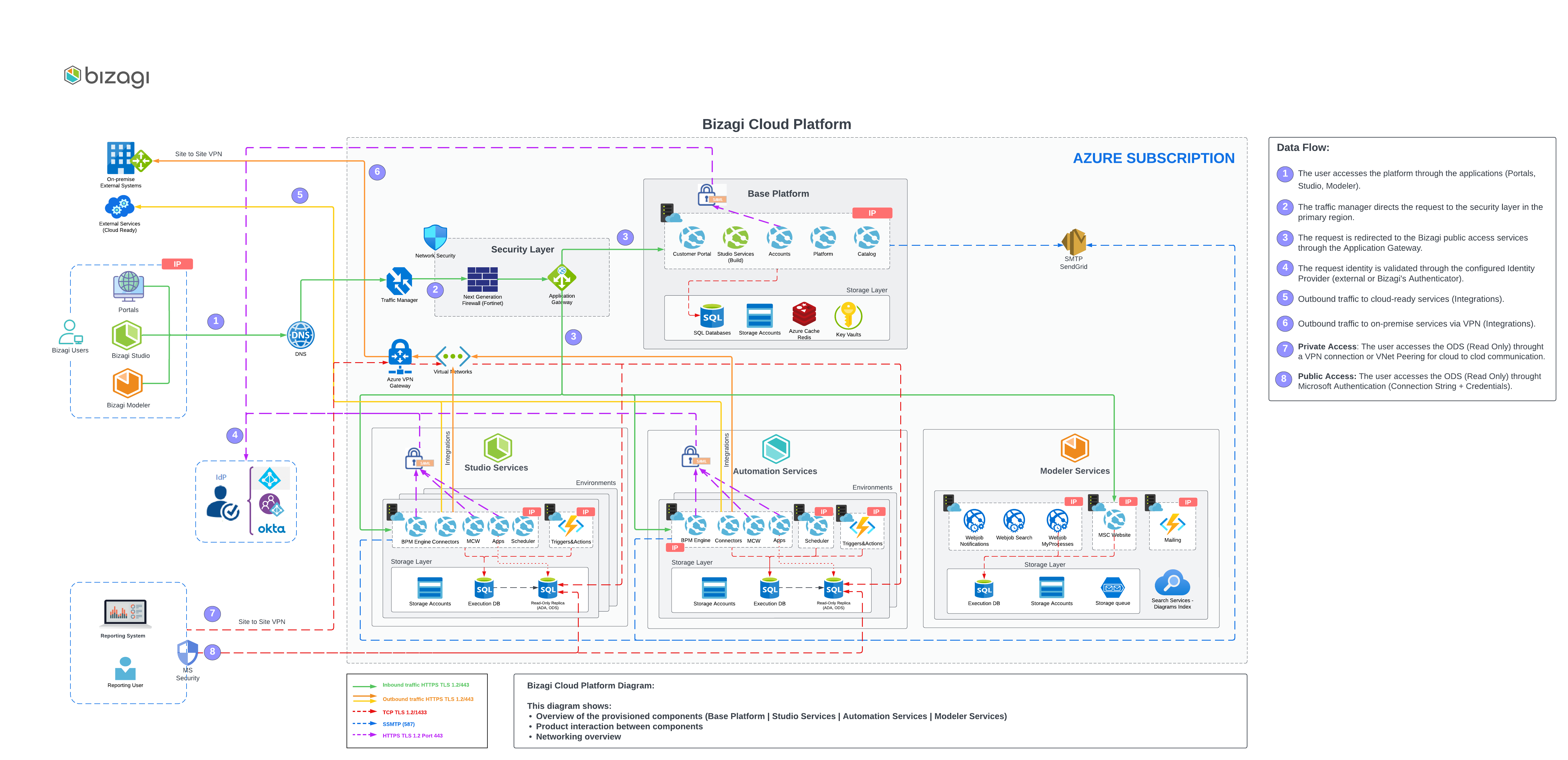Overview
Powered by Microsoft Azure, our platform leverages the latest technologies and techniques to offer a secure and reliable cloud service, allowing you to design, automate, test, and run your business applications in high-performance cloud environments.
Bizagi Cloud Services offers a virtual private cloud that grants each customer access to an isolated environment where the customer’s data and resources are not shared (encompassed within a dedicated customer subscription). Having separate resources, along with data isolation, allows for more predictable performance and gives a basis for strict compliance in terms of data privacy, best governance and security practices.
Bizagi Cloud Services introduces a service-oriented architecture designed and built for the cloud. By implementing a highly modular structure (based on a service-oriented architecture), the platform produces compatible and independently deployable services that are easy to update while leveraging modern services that enhance security, reliability, and scalability. This structure and architecture enable Bizagi's continuous delivery process to keep up with the demands of software evolution.
A service-oriented architecture design makes the services flexible to quickly adapt to new business or IT requirements. Service orientation is an approach fit for the cloud due to the flexibility inherent in loosely coupled architecture.
The modularity of the infrastructure is based on web applications' independent modules. Each service (Modeler, Studio, Automation) consists of a set of independent web apps that include middleware systems such as interfaces or databases that process information based on the purpose of the web app. Isolation of each web app from others reduces the load on the whole system, which prioritizes requests based on their destination.
For example, Studio Cloud Services handles data synchronization among co-developers differently than integrations with external systems. This architecture also permits robust control and administration of each module.
For your end users, to access any of the available portals, all they need is a browser (either Microsoft Edge, Google Chrome, or Mozilla Firefox). Navigation is done using HTTPS.
Bizagi Cloud Services include resources that are shared among all Services:
•DNS: resolves and routes each service's unique URL.
•Traffic manager: routes requests to the customer's subscription while considering the availability of the service.
•Security layer: a logical tier that filters requests and protects access while having a next generation firewall: It offers IDS, IPS, and antimalware protection, along with preventing leaks and protecting the ports.
•VPN gateway: it is intended for integration purposes, providing a secure way to access systems, servers or services, that are not exposed via the internet.
•SMTP services: you are entitled to use Bizagi's email service (which comes shipped in along with the subscription). This module is configured for all the environments of your subscription.
The Base Platform Services layer supports the Bizagi Cloud ecosystem. It provides the core functionalities that make it possible for other services—such as Automation Services, Studio Services, Modeler Services, to function in a coordinated, secure, and efficient manner.
•Customer Portal: where the management of the entire platform is centralized. This web app allows managing the users of the different services acquired from the Bizagi Cloud Platform.
•Studio Services (Build): Bizagi's web application designed to facilitate the creation, deployment, and management of Studio Services within the PaaS offering
•Accounts: authenticates users added to the customer subscription, and validates users included within each project of a subscription.
•Platform: controls access to Bizagi’s platform resources, for example, users in the subscription or available environments.
•Catalog: a repository of metadata for all of your cloud-based services.
•GenAI: this web enables the use of advanced AI capabilities through Azure Open AI to power Bizagi's AI services, enhance business processes and user interactions.
•Monitoring Center: is a comprehensive portal designed to provide enhanced visibility into platform performance and process execution. Tailored for customers with Gold Support and above, this portal offers increased insight into service health, process metrics, and performance indicators, making it an essential tool for platform administrators and project owners.
Azure AI Services
AI Services use Azure Open AI to power Bizagi's AI services such as Ask Ada, AI Agents and Enterprise Knowledge. Each Azure OpenAI service instance is private to its respective subscription, ensuring that data and resources are securely isolated and accessible only to the authorized users within that subscription. Bizagi integrates Content Safety features to detect and flag potentially harmful or undesirable content in images and text, ensuring safer and more responsible AI interactions.
Storage layer: encompasses the Database, the read-only replica for ODS and Ask Ada, the vector database supports the AI Bizagi Data Knowledge, multiple Storage Accounts, Cache Redis, Key Vaults, and Log Analytics. Log Analytics support both the Monitoring Center and our internal monitoring processes. Additionally, Key Vaults are used to securely store passwords and sensitive information, enhancing the protection of critical data.
Bizagi PaaS Services
The integration of Modeler, Studio, and Automation within Bizagi PaaS provides a holistic solution for organizations seeking to optimize and automate their business processes. The services are designed to work together seamlessly:
•Design with Modeler: Begin by mapping out and documenting your business processes collaboratively.
•Build with Studio: Transform these models into fully-functional applications, configuring data, rules, and interfaces.
•Run with Automation: Deploy and execute your applications in a secure, scalable cloud environment, managing and monitoring them effectively.
This integrated approach ensures consistency throughout the process lifecycle, reduces the time to deployment, and supports continuous improvement initiatives.
For a detailed description of the infrastructure components of each service, refer to the following articles:
•Modeler infrastructure description
•Studio Cloud infrastructure description
•Automation infrastructure description
Last Updated 11/4/2025 3:23:12 PM
